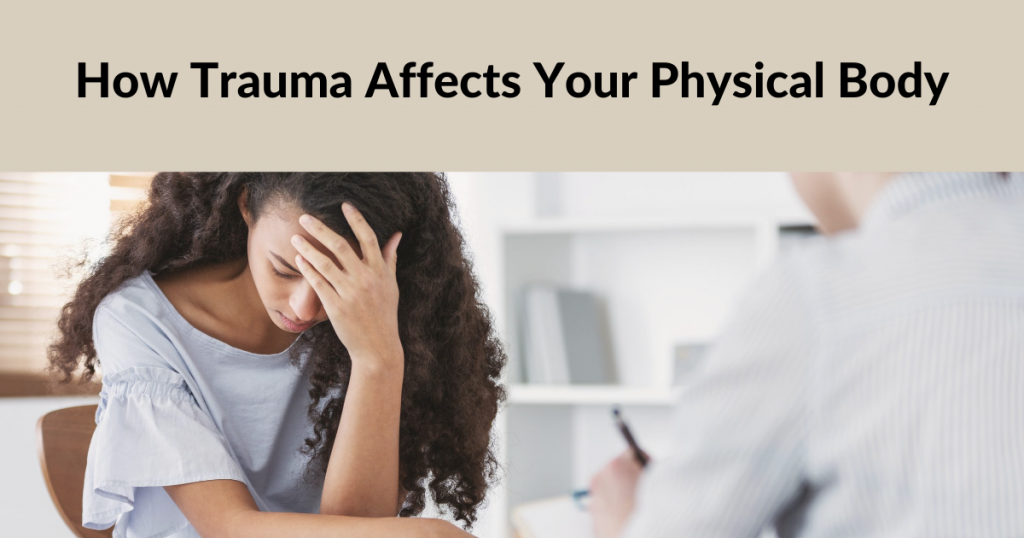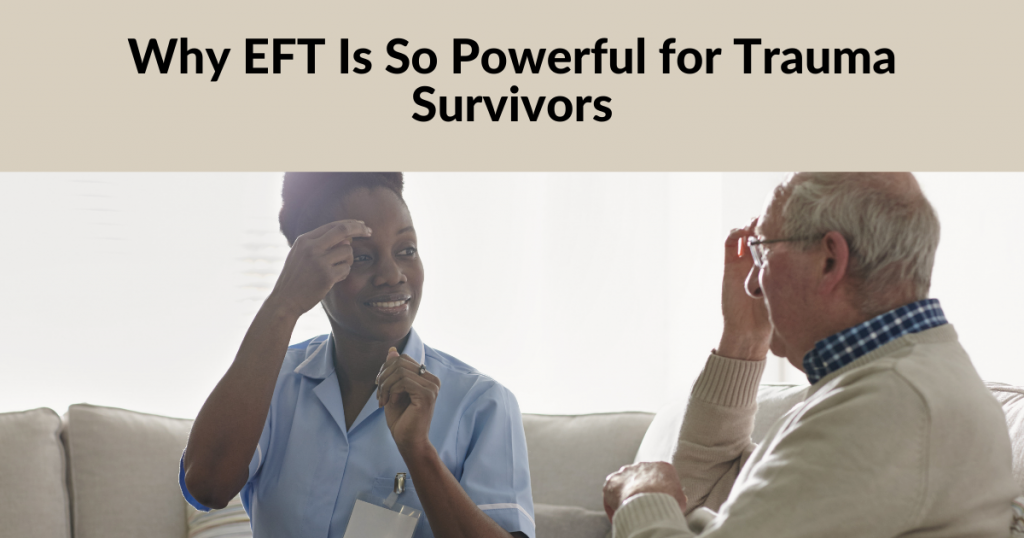 How Trauma Affects Your Physical Body
How Trauma Affects Your Physical Body
Grace was bullied in middle school because she walked with a limp. For years, she endured the jeers and cruelty of her classmates. As she got older, she thought she’d left behind the trauma of being bullied.
But when she opened her business, she had trouble getting any traction. She’d talk to potential clients but she couldn’t seem to get the sale. She wanted to appear on podcasts and work as a speaker to bring more exposure to her business but she kept getting turned down and she couldn’t figure out why.
Finally, Grace reached out to a business coach, Jenn, who specialized in helping women just like her become more visible. Grace shared her story and asked for the other woman’s advice.
After listening, Jenn wanted to know if Grace had ever been bullied or survived a traumatic situation. At first, Grace wasn’t sure where the coach was going but Jenn explained that trauma affects a person for years to come.
Your Body Is Your Home
Your body is your home. It’s the only one you’ve got on this Earth and when it’s violated due to trauma, it essentially vandalizes your home. This can leave you with physical and emotional scars that last for years to come.
The trauma can come in many forms. Perhaps you were sexually assaulted by a caregiver when you were young. Maybe you grew up in a home where you saw domestic violence regularly. Perhaps you survived a terrifying accident or were bullied by your peers during school.
Your Trauma Keeps You Playing Small
If you’ve experienced trauma as a child or teen, you may have internalized a fear of being seen. You may not have even realized it at the time but some part of your mind decided that if you stay safe the bullies or abusers couldn’t find you.
This a valid survival tactic as a kid or teenager with no power over your situation. But it creates a problem as you get older and step out into the world. It’s harder to promote your business and grow your career because on some level, you’re still that scared kid who hopes you’re not seen.
The Trauma Continues
Your body may continue to send you messages that a situation isn’t safe because it triggers old responses. For example, right before a big presentation, you might get a terrible stomachache or fight back against a panic attack.
These are acute symptoms that go away after the situation that you perceived as dangerous is over. In the example above, when the presentation is finished, your brain no longer thinks you’re in danger and your symptoms improve.
But you may also experience long-term physical symptoms as a result of the trauma or bullying such as depression, anxiety, chronic pain, sleep problems, or post-traumatic stress disorder (PTSD).
Understanding the connection between your trauma and your desire to be unseen is an important first step. Now that you’re aware of the connection, you can begin the journey towards healing with the support and compassion you need.
 You Carry Your Trauma with You
You Carry Your Trauma with You
When Marcy was a kid, her father was an alcoholic. Sometimes, he’d get physically violent with her mother and she saw her father beat her brother a few times when he tried to intervene in the conflicts.
Marcy coped with the dysfunction by trying to be the “good girl”. She worked hard to get the right grades and a scholarship to college. Once there, she went into the nursing field where she was at the top of her class.
Later, Marcy went on to work at a local hospital. She enjoyed her job but as the years passed, she kept missing out on promotions. She couldn’t understand why until a co-worker pointed out that Marcy rarely acknowledged her own efforts.
She said, “You let others take the credit when a good job is done. I know you think you’re being part of the team but it’s holding you back from getting where you want to go.”
Like Marcy, trauma may be holding you back from achieving your career or business goals. Here are three ways you might be carrying your trauma with you…
You Numb Your Pain
Carrie loves her work as a hospital chaplain. She gets to bring hope and peace to families in the worst moments of their lives. But every night after work, Carrie goes home and drinks two to three bottles of wine.
Like many trauma survivors, Carrie was attracted to a field where she can help people going through darkness. But unfortunately, Carrie never dealt with her own inner trauma and now it’s frequently brought up as the result of her work. In order to cope, she numbs the pain at night with alcohol.
Even if you know it’s a bad idea, you might be tempted to quiet your trauma, too. Perhaps you drink too much, shop compulsively, or gamble excessively. Doing these things temporarily masks your pain and makes you feel in control again. But the feeling only lasts a little while before you have to seek your next fix.
You Try to Be Perfect
Marcy always focused on doing everything for everyone. Living through so much trauma left her feeling responsible for those around her. Now she worries about letting others down and wants them to think her life is perfect.
Not always—but sometimes—perfectionism can be a mask for deep pain. On some level, you’re hoping that if your life looks perfect from the outside, the pain inside will finally stop. But this doesn’t work. It only further isolates you as you feel the need to keep up appearances.
You Don’t Want to Be Seen
You’re happiest when you’re behind the scenes. You’d rather make the magic happen behind the curtain than be the one upfront taking the bows. At least, that’s what you tell yourself.
While this strategy might make you feel safe, it also means you don’t ever get to take ownership for the amazing things you do. Instead, you’re stuck playing it safe and staying home from the ball.
It’s Time to Heal
You can’t grow in your career and business unless you let yourself heal from your past. It’s the only way forward or you’ll keep repeating this miserable cycle where you have to hideout.
It’s time to acknowledge your power and strength. You didn’t have a choice about the trauma and bullying that happened to you. But that doesn’t mean these things must define your life or become the whole story. You can begin again and write a new story at any moment you choose.
 Why EFT Is So Powerful for Trauma Survivors
Why EFT Is So Powerful for Trauma Survivors
Willow was involved in a school bus accident when she was in middle school. Although she survived, some of her classmates didn’t. In the years that followed, Willow continued to have flashbacks, nightmares, and difficulty concentrating. She received counseling but continued to struggle with the after-effects.
When she was older, Willow had difficulty letting her own children go to events without her. She realized she needed help and reached out a counselor who introduced her to the concept of EFT.
What Is EFT?
EFT stands for emotional freedom technique. Some people call it “tapping”. It involves touching various parts of your body to release physical trauma. Everything that happens to you and around you creates energy. When you have positive experiences, your body holds onto this positive energy. This may explain why children from healthy homes often go on to have successful careers and fulfilling marriages.
But the body also stores negative energy, too. When you experience traumatic events, you may not realize that your body has absorbed the experience. If you don’t release it, you continue to carry it with you for years or even decades. Perhaps this is why children who come from difficult home lives have more challenges in their personal and professional lives.
How Does EFT Work?
EFT works to help you release negative energy. But you can’t just tap anywhere – there are certain pathways in your body. These are called meridians.
They are the connections between one area of your body and the emotions you experience. For example, if you’re feeling indecisive then tapping under your nose while you repeat a soothing mantra may be just what you need to start moving forward.
Why Is EFT Effective for Trauma Victims?
Most victims carry some physical form of the trauma even if they have no visible scars. Willow never had a scar from the accident she was in. Sure, she’d had a few minor cuts and bruises but she healed seemingly fine physically.
But she carried a lot of pain in her abdomen, even years after the event. Thanks to her new therapist, Willow realized this was due to her anxiety over her children going to school daily.
She began learning how to tap the area underneath her eye to access the stomach meridian. As she did, this helped her let go of the obsessive worry she felt and trust that her children would be protected by the universe.
Depending on your trauma, a trained therapist who is familiar with EFT can help you identify which meridians you need to target. While EFT may help you early on, it can take a few weeks to learn how to release all of the negative energy you’ve been holding onto. So stick with it and don’t give up if you don’t immediately feel better.
Learning to Love Your Body Again after Trauma & Bullying
Tina was lying in bed with her husband one night when he told her, he loved the way she felt in his arms as he held her.
The comment troubled Tina because she couldn’t remember the last time she felt her husband’s touch. After that, Tina noticed that when her young son held her hand, she rarely felt the sensation. She also couldn’t feel it when her daughter leaned into give her a hug.
Medical testing showed that there was nothing wrong with Tina’s sensory perceptions. So she talked with a friend. Her friend had worked with trauma victims before and knew that Tina had been sexually abused for years as a child.
“It’s a result of the trauma,” She explained. “It’s not that something’s wrong with your body. It’s just that some victims turn off feeling without realizing it. At first, this helps you cope through abuse. But even when it’s over, some survivors have trouble with staying in their skin.”
Why Can’t I Feel?
Imagine you’re in your home. You can’t get your living room light to come on. First, you try changing the bulb. Then you call an electrician. The electrician tells you that your wiring is fine then gently points out that you never flipped the switch to on.
In order to cope with a difficult situation, you may have turned off certain emotions or sensations in your body. Sometimes, it’s easier to feel nothing than to feel the pain, shame, and discomfort of repeated violations.
What Can I Do?
Start by trying to dial into your senses right now. Can you feel the chair against your back or the phone in your palm?
Is your neck tight as you stare at your screen? Are your shoulders hunched or are you completely relaxed? Do you feel your stomach muscles tightening as you observe the sensations you’re experiencing?
You may also want to take up physical activities that help you to stay in the moment. For example, some people find that “art therapy” that involves dancing, chanting, or drum circles to be helpful.
Other trauma survivors prefer yoga, kickboxing, or mindful stretching. However if that feels too overwhelming, you might find participating in theater or improvisation classes to be useful. These give you the space to explore your body sensations while focusing on the class itself, rather than your emotions.
What Should I Know Ahead of Time?
Understand that reconnecting with your body after trauma can be a difficult thing to do. It can be accomplished with time and sustained effort. But when you first start doing this, you may notice a variety of emotions welling up. This is common and, in the moment, it may feel overwhelming.
You might want to let a supportive friend, a loving partner, or a therapist you trust know what’s going on. Explain that you may reach out in the coming weeks as you work through these difficult emotions. Know that you don’t have to walk alone in your healing journey.





Leave a Reply